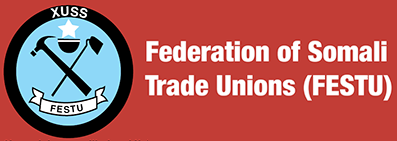The Federation of Somali Trade Unions (FESTU) welcomes the adoption of Somalia’s 9th National Development Plan (NDP-9) which holds poverty alleviation and resilience building at its heart. NDP-9, which provides a blueprint for how the country will respond to pressing social and economic challenges over the next four years, was the result of an applaudable, participatory process.
Organised labour, under the ambit of FESTU, appreciate the efforts of the Federal Government, through the Ministry of Planning, Investment & Economic Development, to consult widely in order to ensure NDP-9 is based on evidence and measurable data, and truly reflects the vision of the Somali people. FESTU and its affiliated trade unions were also active contributors to this extensive consultation process. We are pleased that the final version of NDP-9 reflects our position and harnesses the many voices within the various sectors of Somali society. By choosing to situate resilience at its core, the NDP-9 speaks to current national realities related to climate change and therefore commits to creating sustainable change which will have ripple effects for years to come.
With its focus on poverty alleviation, including incorporating how anticipated debt relief will impact the country’s development trajectory, NDP-9 speaks to the innate aspirations of Somali workers. In addition to putting more progressive macro-economic policies in place, we are heartened that there is commitment to implement strategies that will impact workers directly. Among the many important goals within NDP-9, we note that Goal 8 – to promote sustained, inclusive and sustainable economic growth, full and productive employment and decent work for all – is an important acknowledgement of the place that workers and job creation occupies in the country’s journey to national development. Furthermore, we are delighted to see that Goal 8.8 makes this acknowledgement explicit by committing to protect labour rights and promote safe and secure working environments for all workers, including migrant workers, in particular women migrants, and those in precarious employment.
It is promising to see that NDP-9 acknowledges that women are underrepresented in the workforce and outlines measures to address this. With the increasing feminisation of poverty that further entrenches women into gendered roles within and outside of the domestic space, it is encouraging to see decisive action against this aspect of gender inequality. On the whole, there are critical crossing cutting imperatives integrated into all 9 pillars of NDP-9, including the first which is to strengthen gender, human rights and other kinds of social equity. This particular strategy is aligned to the FESTU’s objectives and those of its affiliated unions, and its inclusion gives the document an inspiring credibility.
Although the road to sustainable change is by no means easy, for too long Somalia has been plagued by multi-faceted social ills that have impacted the ability of generations to move themselves out of poverty. With our current efforts to instil democratic values and human rights in all our institutions and ways of working, it is time for us to think big and go beyond what we previously believed was possible.
The momentous task of pulling together NDP-9 has been achieved. However, the work must not stop there. NDP-9 should not be seen as a static document but a living one. FESTU and its affiliated unions will not only be active agents in bringing NDP-9 to life, but in tandem, will be monitoring implementation to ensure the letter and spirit of NDP-9 becomes reality.
